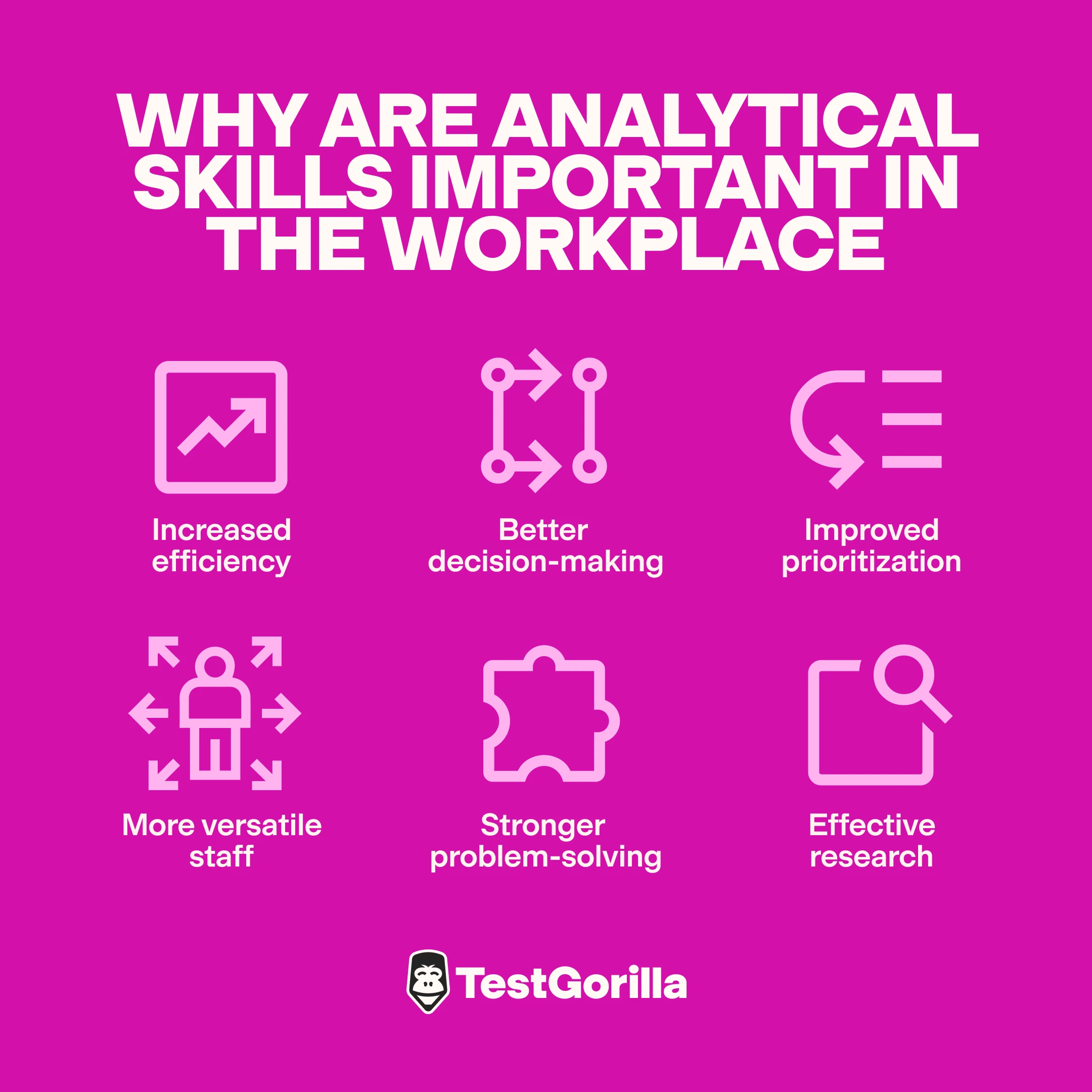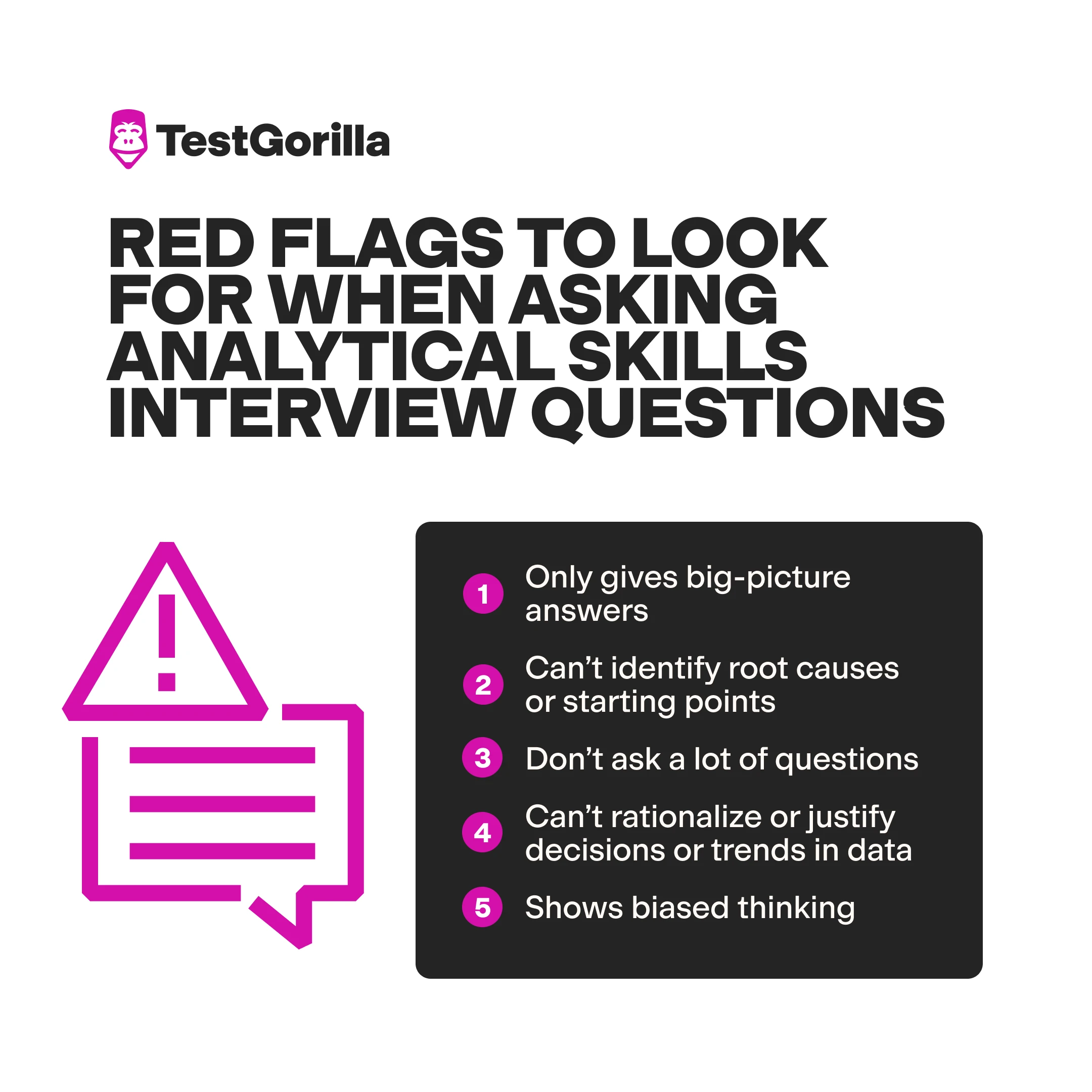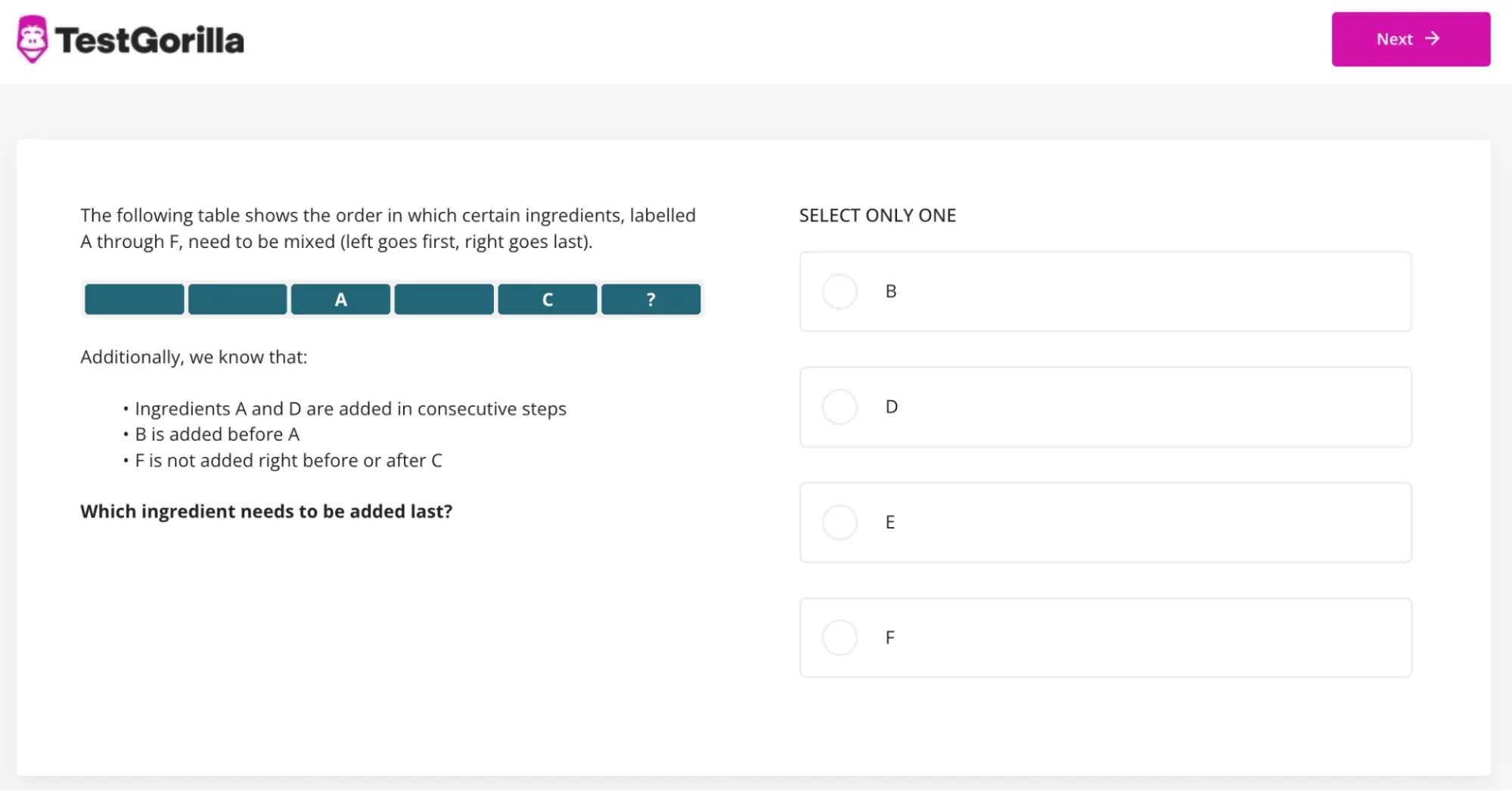Top 7 analytical skills interview questions and why they matter
Discover your candidates’ analytical skills and potential performance
Employees with analytical skills bring major benefits to your business by making data-driven decisions, offering critical insights, and solving complex issues.
You want to determine if a candidate has good analytical skills before you hire them, but assessing these skills through resumes and job interviews can be difficult.
You can accurately assess this skill set by:
Focusing on the right interview questions to determine analytical skills
Using pre-employment skills tests to gain hard data on the capabilities of a potential hire in addition to their interview responses
Read on for examples of the best analytical skills interview questions and how to find star employees.
Table of contents
- What are analytical skills?
- Why are analytical skills questions in interviews important?
- 7 analytical skills interview questions you need to ask
- Red flags to look for when asking analytical skills interview questions
- How to assess analytical skills
- Assessing for analytical skills to find the best candidates
- Analytical skills interview questions FAQs
What are analytical skills?
Analytical skills, a subset of critical thinking skills, are the skills that an employee uses to analyze data, information, and patterns. According to psychologists, analytical thinking is the “pure brain power” on which the rest of a person’s intelligence and abilities rest.
Employees with high-level analytical skills can process data coming in, contextualize it, and pull out important takeaways and solutions for the rest of the team and the company.
But analytical skills aren’t just about data analysis; employees with high-level analytical skills can solve all sorts of small- and large-scale problems that arise in the workplace.
For example, an employee monitoring a crowded customer feedback inbox for a project management app notices, amongst the various complaints, a recurring issue with the UX popping up. They identify this pain point, present their findings to the senior leadership team, and propose a simple solution that is successfully implemented.
As such, it’s easy to see why analytical skills also factor into an employee’s problem-solving skills.
Why are analytical skills questions in interviews important?
Hiring for skills, including analytical skills, is on the rise across companies. The US Department of Labor has also identified analytical thinking as a key soft skill in 21st-century workplaces.
However, assessing analytical skills can be difficult because it’s nearly impossible for a candidate to display them on a resume effectively.
Using analytical and problem-solving interview questions when you assess candidates helps you gauge their practical skills: their ability to identify patterns, form insights, and apply those insights as solutions to your company’s problems.
Here are the main benefits of using interviews to hire employees who excel analytically:
Increased efficiency: Analytical people understand what’s most important for your business and focus their energy there, making them great for positions like strategists.
Better decision-making: Analytical employees identify problems, gather data, develop logical solutions, and make decisions based on objective information.
Improved prioritization: Analytical workers can objectively evaluate multiple tasks and focus on the most important ones, leaving lower-priority action items for later.
More versatile staff: Staff with these skills can quickly adapt to changing circumstances and wear different hats.
Stronger problem-solving: Employees with solid analytical skills are able to make concrete decisions effectively and take swift action to resolve issues.
Effective research: Analytical people don’t take things at face value. They dig deeper, draw conclusions, and use their findings to make better decisions.
The best insights on HR and recruitment, delivered to your inbox.
Biweekly updates. No spam. Unsubscribe any time.
7 analytical skills interview questions you need to ask
The best analytical skills questions put the interviewee in a real-life, on-the-job scenario so you can see how they would use their analytical skills in your company.
Tailoring these questions to your specific industry is important. Analytical skills examples in a creative field might include UX improvements, while in a more data-driven field, you’d focus more on something like KPI analysis.
Here are some seven top examples of behavioral interview questions for analytical skills.
1. Can you describe a time when you had to solve a problem with limited information? How did you approach the situation?
These questions and answers evaluate a candidate’s capability to think critically and make decisions with limited information. It measures their problem-solving skills and their capacity to deal with ambiguity.
A good answer should show how the candidate approached the problem step by step and outline their logical reasoning.
Sample answer:
Faced with a sharp drop-off in complaints and bug reports for our e-commerce checkout system, instead of being complacent and thinking our software was finally perfect, I found and fixed a bug so we could resume receiving feedback to improve the platform and help our customers drive more revenue.
2. What methods do you use to track performance metrics?
This question evaluates the candidate’s competency in establishing and implementing effective measurement systems. They can show their understanding of performance tracking and their ability to create relevant metrics.
A good answer here shows how the candidate not only finds and tracks the data but also distills meaning from it and communicates that meaning effectively and actionably.
Sample answer:
I track customer metrics, including customer acquisition costs (CAC), customer lifetime value, retention stats, and satisfaction measures, using proprietary backend software. I compile these metrics into weekly reports distributed to the department, accompanied by concrete takeaways and recommendations based on existing metrics.
3. How do you ensure your metrics are accurate?
This question can be used to evaluate a candidate’s attention to detail and commitment to data accuracy. It assesses their ability to validate and verify information and their understanding of potential sources of errors or biases.
With this question, you’re looking for their ability to correlate cause and effect in developing verification methods, plus their ability to explain their thought process.
Sample answer:
With reference to our average baseline for monthly signups, I ensure that those signups are aligned with our visitor count. As long as the changes in the two trends remain related, I can rest assured the traffic numbers are accurate. If I notice an inconsistency, I immediately call the web developers to troubleshoot and diagnose the issue.
4. When faced with a decision between two or three options, what criteria do you use to make your choice?
Here, you’re assessing a candidate’s decision-making skills and ability to evaluate multiple options objectively. Their response shows their ability to think analytically and prioritize criteria based on the context of the decision.
A good answer shows how candidates are able to compare different and wide-ranging factors in making a decision and ideally includes an example of how the decision made this way proved to be correct.
Sample answer:
I try to be as rational and logical as possible, which means making decision matrices to weigh alternatives and their future value. I also seek out subject matter experts in the company with a history of making similar decisions so I can add their insights to mine. Once I am clear on which option provides the best return, I proceed.
5. Could you tell me about a project or situation where you exercised your analytical skills productively?
This question lets candidates show off a practical application of their analytical skills. They can use it to demonstrate their ability to identify problems, analyze data, and propose practical solutions.
In today’s business environment, with more data than ever pouring into workplaces, almost 60% of companies are concerned with their employees’ abilities to turn data into insights. A question like this gives the candidate the opportunity to show how they’ve done this in real life.
Sample answer:
My previous company’s hiring manager made a faux pas on Instagram. After researching and analyzing similar situations across similar companies, I recommended we unschedule posts for the next 10 days and issue a public apology and solution. By the time we reactivated our regular scheduling, the backlash had died down and we were able to focus on the value we provide to our customers rather than the unfortunate post.
6. When facing a big-picture problem, how do you determine the best first step for tackling it?
This question enables the candidate to show their skill at working backward from a problem. This is a critical element of analytical thinking because it proves a candidate has an understanding of cause and effect.
A strong answer might show that the candidate already has a specific workflow in place for determining where to start with an issue, enabling you to see into their decision-making process.
Sample answer:
First, I summarize the problem in a simple one-page document. Based on this high-level analysis, I work out which internal and external stakeholders we need to resolve the issue. Once I have this list, I use my relationships to pull a team together to look at the problem and create an action plan for tackling it. This way, I always ensure we have the right experts in the room and avoid silly mistakes and siloed thinking.
7. Can you give an example of a time when you developed, changed, or improved a workplace process?
With this question, you are letting the candidate show off their ability to go from conceptual analysis to practical implementation. Analytical skills are at their best and most valuable in a candidate when they’re accompanied by the ability to act on them.
Good answers to this question demonstrate a concrete example of process development and give context to the benefits that the new/updated procedure brought.
Sample answer:
I implemented an automated inspection system to address a bottleneck in an automotive supplier's manufacturing line. The process was too slow, and quality assurance wasn’t up to industry standards. This system, equipped with machine learning capabilities, replaced the manual inspection process for car seats, increasing efficiency by 52% and defect detection by 36%. This change reduced costs and enhanced customer satisfaction, with a key customer recommending our company to the biggest carmaker in the region.
Red flags to look for when asking analytical skills interview questions
So you know what to look for, but what red flags should you watch out for when using these types of questions?
Some common warning signals from candidates when answering an analytical skills question in interviews include:
Only gives big-picture answers: Analytical thinking is all about breaking down problems into smaller parts. If a candidate can only give you the broad strokes of a problem, chances are they can’t get into the nitty-gritty.
Can’t identify root causes or starting points: Being able to work backward from existing data or situations is a key example of analytical skills.
Don’t ask a lot of questions: Analytical skills rest on questioning, probing, and curiosity to seek out and recognize patterns, so candidates should be giving you both questions and answers. Poor communicators often struggle to turn analytical skills into valuable business solutions.
Can’t rationalize or justify decisions or trends in data: Analytical skills are useless without being able to ask and understand the “why” when it comes to information and actions.
Shows biased thinking: Any kind of bias or blind spot, major or minor, can throw a wrench into an employee’s otherwise useful analytical thinking skills.
How to assess analytical skills
Beyond the specific questions you ask, there are a few other approaches we recommend to measure your candidates’ analytical skills most accurately. Using various sources to assess analytical skills gives you a much more thorough understanding of your candidates’ strengths and weaknesses.
A structured interview approach featuring set questions like the ones above helps you focus on analytical skills rather than a candidate’s charm and interviewing ability.
A structured interview differs from an unstructured one in the following ways:
Unstructured Interview | Structured Interview |
Questions asked on the spot | Questions pre-prepared |
Topics approached in no particular order | Set order for questions and topics discussed |
Enables qualitative assessment of candidates through open-ended conversation | Enables quantitative assessment of candidates through specific interview benchmarks |
Allows for bias and subjectivity based on non-job factors | Helps promote objectivity by removing bias and revealing gaps in candidate experience |
With its focus on objectivity, structured interview preparation gives you a much stronger view of how an employee has approached informational and analytical situations in the past.
Talent assessments also go hand in hand with your analytical skills interview questions.
Using an interview to gauge an employee’s critical thinking skills gives you insight into how they might solve problems in the workplace. However, assessing their analytical skills ensures that they are able to recognize and reason through those problems.
Sign up for a free account to start assessing analytical skills today and hire a more critical workforce!
TestGorilla offers custom skills tests for many of the most important elements of analytical thinking. By using skills assessments alongside interview questions, you can determine the employee’s objective ability and test for a wide range of talents, including analytical, critical thinking, leadership, and communication skills.
There’s a strong chance a candidate might prove their analytical thought process through a skills test, like our Problem Solving test:
For more sample questions, please take a look at our test’s full preview.
This test gauges a candidate’s ability to tackle complex challenges and devise effective solutions. It measures their ability to break down issues, identify their roots, and systematically find optimal solutions.
Analytical skills tests are best used as pre-interview screening tools because:
You only invite the best candidates to interviews
You create benchmarks in analytical skills for candidates
You can fine-tune your job descriptions based on skills rather than experience
Ocean Outdoor UK used this approach to decrease its rate of unsuccessful hires by around 44%.
You can even use skills testing to measure the abilities of your current workforce, pinpoint weaknesses, and see how to improve analytical skills among team members through upskilling and mentoring initiatives.
To learn more, check out our blog post on performing skills gap analyses and bridging talent pages.
Assessing for analytical skills to find the best candidates
Keeping analytical skills high on your priority list for new hires pays off in the long run.
Highly skilled employees can adapt to various job roles and solve problems efficiently. They can also conduct effective research and contribute to your business’s long-term growth.
When you use analytical skills interview questions in a structured interview and hire for skills using pre-employment testing, your new employees become major assets to your company.
With a growing library of 400+ tests, TestGorilla makes it easy to accurately evaluate your prospective hires’ individual skills and aptitudes during the hiring process.
Want to know how TestGorilla can help you find candidates with the best analytical skills?
Analytical skills interview questions FAQs
Testing for analytical skills in potential hires is important, but you might still have some questions about how best to go about it.
What does it mean to have strong analytical skills?
Strong analytical skills mean you can process information and data effectively and intelligently and then act on that information. For example, an employee responsible for auditing the effectiveness of a company’s marketing budget must be able to distill different analytical factors and engagement metrics into a big-picture takeaway that can be understood and utilized easily.
What is an example of analytical thinking?
One example of analytical thinking is an employee facing a drop-off in an important performance metric for their team. They must not only evaluate the issue to find its source but also decide on the first step to improve the metric. An employee with strong analytical skills can evaluate the information at hand to make an informed decision on the optimal course of action.
How do you demonstrate analytical skills in an interview?
If you are a candidate, make sure you go in prepared with some examples of specific times you used analytical skills, such as:
Figuring out the cause of a problem based on existing data
Forecasting or spotting a new trend
Re-evaluating an existing process
Coming to a correct conclusion by analyzing an ongoing pattern
You've scrolled this far
Why not try TestGorilla for free, and see what happens when you put skills first.




















